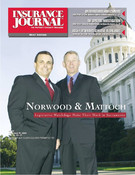In response to New York Attorney General Eliot Spitzer’s charges against super brokerage Marsh McLennan, California Insurance Commissioner John Garamendi proposed new regulations for agents and brokers Oct. 20 which would require full disclosure of any financial incentive they may receive for selling insurance products on behalf of certain companies.
“We’re going to pursue this very rigorously,” Garamendi told Insurance Journal. “Our regulations are going to go forward and we are going to pursue the criminal as well as the civil statutes here.”
Garamendi’s proposal outlines several situations in which agents and brokers would be found in violation of the Insurance Code. Failure to comply with the proposal’s requirements could result in fines of up to $10,000 per incident, a cease and desist order, and the possible revocation of a company or broker’s license.
If a broker fails to disclose to a client “all material facts” concerning the receipt or potential receipt of income from a third party, “which income derives in whole or in part from a transaction on behalf of the client,” he or she will be in violation of Insurance Code section 790.03(b).
If a broker is said to place his or her own financial or other interest above that of his or her client, the broker will be in violation of Insurance Code section 790.02
In addition, a broker will also be found in violation of Insurance Code section 790.02 if, with either new or renewal business, he or she fails to provide the client with the proposal of a best available insurer; advises a client to select an insurer other than a best available insurer; advises a client not to select a best available insurer from among multiple insurers suggested to the client, and/or fails to take reasonable measures to obtain a quote from an insurer that might be a best available insurer.
‘Best available insurance’
When asked what defines “the best available insurance,” Garamendi said, “Brokers know. They know the best deal. And if they’re not delivering the consumer, they stand at risk of being fined up to $10,000 per incident, losing their license and being out of business, or somewhere in between those two.”
“I think we are all truly shocked and very dismayed by the nature of the allegations that are contained in the litigation filed by the New York Attorney General,” Steve Young, IBA West general counsel, told IJ.
“I don’t think anybody reasonably anticipated that there would be evidence uncovered that brokers were essentially conspiring with others to create false quotes, to rig bids, and otherwise attempt to intentionally mislead and defraud customers. We share the commissioner’s assessment that it is appropriate for brokers to disclose any compensation materially that they get from an insurance company or any other third party that could inform or influence the broker’s decision to recommend a particular policy or a particular insurer to a customer.”
However, Young said that IBA West has two major objections with Garamendi’s proposed regulations, the first being that they would apply not only to brokers, but to agents as well. “We believe that the Commissioner does not have the authority to extend this type of requirement to agents. Moreover, we don’t think it’s anything that he needs to do. [In addition,] the commission plan that insurance companies use has to be filed and approved by the Department of Insurance to begin with before the insurance company can even use it.”
“The second concern which is far more serious is that this regulation, if it was to be adopted, would create an unprecedented legal standard of care on insurance brokers and agents, which is a higher standard of conduct than imposed on any other professional in any other industry,” Young added.
For a broker to be required to procure the best available insurance from the best available insurance company is a standard that is impossible to meet, he said. “Best, like beauty, is in the eye of the beholder. It’s a question that really can’t be answered until after the fact.”
Attorney General steps in
On Oct. 29, California Attorney General Bill Lockyer also announced that he has launched a formal investigation into possible antitrust violations and fraud by insurers and brokers. Lockyer said the probe’s initial focus will be on bid-rigging and other antitrust violations, including price fixing, which is prohibited by California’s antitrust law, known as the Cartwright Act.
He said he will continue to work with Commissioner Garamendi on his investigation into contingency payments to brokers.
Lockyer has established an e-mail whistleblower hotline to receive complaints and information about the alleged practices under investigation and encouraged employees and clients of insurance companies or brokers to submit such information to insurancewhistleblower@doj.ca.gov.
“California’s laws could not be clearer,” said Lockyer in a statement. “Businesses cannot conspire to give themselves an unfair advantage over competitors or harm consumers by keeping prices artificially inflated. They cannot breach their duty to tell customers the whole truth. Any insurance company or broker violating these laws will be held accountable.”
Trouble out West
Other states opened their own probes following the news of the initial Spitzer charges. Both the Arizona and Oregon DOI’s confirmed that they are looking into the allegations of bid-rigging and reviewing their own broker regulations.
Wyoming Insurance Commissioner Ken Vines said in an e-mail, “The Wyoming Insurance Department is in a fact finding mode with regard to the issues raised by Attorney General Spitzer’s actions concerning Marsh.The Wyoming Insurance Code currently contains provisions which, in my opinion, would prohibit the practices described in the N.Y. investigation. The Department will not undertake any new regulations in this area until the extent of the problem in Wyoming is fully determined.”
More states are reviewing the case as well–Washington, Utah, New Mexico, Colorado, and Idaho are also cooperating with the NAIC effort.
The Los Angeles Times reported that Marsh launched an internal investigation into a report into brokers from its Los Angeles-based Private Client Services Group, who were ordered to stop selling personal coverage lines from AIG in California, Florida, and Hawaii, because doing so would have reduced the amount of contingent commissions Marsh expected to receive from AIG.
“We are at the very early stages of a long and very sordid chapter in the history of America insurance,” Garamendi said. “This is a terrible, disgusting situation of breach of ethics, breach of criminal law, and breach of insurance law … it’s going to have a very detrimental effect on the industry.”
Topics California Carriers Agencies Legislation
Was this article valuable?
Here are more articles you may enjoy.


 Hackers Used AI to Breach 600 Firewalls in Weeks, Amazon Says
Hackers Used AI to Breach 600 Firewalls in Weeks, Amazon Says  Mexico’s Cartel Violence Could Hit Economy and Insurance Segment: AM Best
Mexico’s Cartel Violence Could Hit Economy and Insurance Segment: AM Best  ‘Meaningful Decline’ in Industry Q1 Underwriting Profit Expected From Winter Storms
‘Meaningful Decline’ in Industry Q1 Underwriting Profit Expected From Winter Storms  Florida Appeals Court Pulls the Plug on Physician Dispensing in Workers’ Comp
Florida Appeals Court Pulls the Plug on Physician Dispensing in Workers’ Comp 


